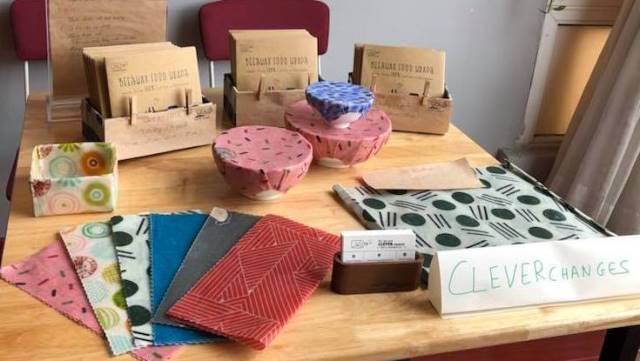Preferring healthy food and eco-friendly products, using less plastic, and encouraging the “Go Green” spirit among the community, more and more Vietnamese youths have taken to living a greener lifestyle.

Samples of beeswax food wrappers by Clever Changes group (Photo: Clever Changes)
Since Dang Hoang Giang, a youngster from Ha Dong district in Hanoi, and his friends introduced their ‘Clever Changes’ project on beeswax food wrappers in March 2017, their products have earned the trust of customers and they have received orders both from Hanoi and other localities such as Ho Chi Minh City, Da Nang, Quy Nhon, and Nha Trang cities.
“When we first gathered together to act for the environment, we just thought of collecting rubbish at convenient stores and classifying them for recycling,” Giang recalled.
However, the more the youngsters got involved in the work, the more difficult it is they realised, as the amount of plastic bottles and nylon is too vast for them to collect.
Therefore, they came up with an idea of finding alternatives to plastic for people, encouraging them to use eco-friendly products and changing customers’ dependence on plastic packaging.
The group then started with using 100% cotton cloths and covering the surface with beeswax in order to turn them into food wrap and bags, which can replace nylon and plastic bags.
The cloth can then be easily recycled by washing cleanly and drying under sun, which helps to ensure hygiene and soften the cloth. A piece of cloth can be maintained for up to a year. When the beeswax is faded, customers can send the product back to Giang’s group so that the cloth will be covered with a new layer of beeswax.
It is tough to absolutely say no to nylon, but by utilising natural alternatives to nylon, reducing single-use plastic and harmful chemical products such as packets, storage containers and straws, every person can contribute to stopping plastic pollution.
Pham Khanh Huyen, the young owner of Green Shop in Doi Can Street in Hanoi, said her shop offers a wide range of green items, from food and cosmetics to washing chemicals.
Minh Ngoc, a student from the Foreign Trade University, admitted that she used to think that by classifying trash, properly disposing of rubbish, and saving electricity, she had done enough to safeguard the environment.
However, after learning about the consequences of rubbish to the eco system, and the alarming situation of deforestation, she has decided that it is not enough to live clean, people should live a greener lifestyle to mitigate humanity’s negative impacts on nature.

Several eco-friendly products of Sen Shop (Photo: Sap Hang Chang Sen)
Water cups, food boxes, bowls and dishes made from bagasse are major products offered to customers by Sen Shop, a group of youngsters in Cau Giay district, Hanoi. The grocery store also sells souvenirs made from bamboo, luffa, and sedge, such as sponges, wallets, straws and tooth brushes.
Kim Chi, member of the shop, said that her group has found their own ways to stimulate pro-environmental consumption behaviour. For example, straws are sold at a high price to encourage people to drink straight from their beverage container. If they still want to use straws, they’d better use a sustainable, recyclable alternative.
More and more young people have shown strong support for shops and labels which have launched programmes to encourage customers to go green. Not only targeting sustainable living, the young customers choose eco-friendly products in the hope of ensuring safety for relatives and families.
It is heartening that the Go Green spirit has been widely taken up among the youngsters and the entire society. Small actions in daily life can motivate practical actions for the good of the environment.